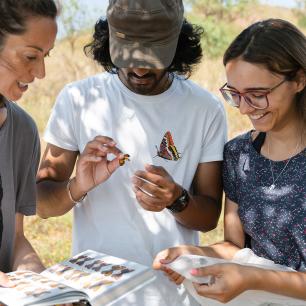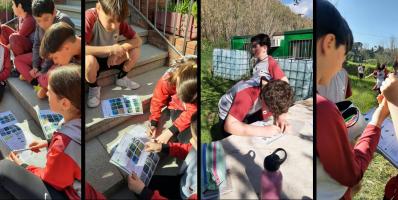Ciència Ciutadana
La ciència ciutadana inclou projectes dissenyats pels científics en els quals els ciutadans participen en la recollida de dades, projectes estructurats pels científics en els quals els ciutadans tenen oportunitats i eines per participar en el disseny del projecte, la recollida de dades i la seva anàlisi; i projectes en els quals els ciutadans participen en totes les etapes del procés científic. Aquests projectes permeten a la societat avançar en una millor comprensió de l’entorn, dels serveis ecosistèmics o dels riscos ambientals, i sovint comporten una major implicació en la conservació de l’entorn i la millora de la salut ambiental per part dels ciutadans. Beneficien, per tant, al col·lectiu científic però també a la ciutadania.


Què és la ciència ciutadana?
La ciència ciutadana és una forma de col·laboració entre científics i ciutadans en el procés de recerca. Els ciutadans poden participar en diferents etapes del procés científic a través de diversos tipus de projectes:
- Projectes contributius: Els ciutadans ajuden en la recollida de dades segons les instruccions dels científics.
- Projectes col·laboratius: Els ciutadans participen activament en el disseny del projecte, la recollida i l’anàlisi de dades, utilitzant eines proporcionades pels investigadors.
- Projectes co-creatius: Els ciutadans es impliquen en totes les etapes del procés científic, des del disseny fins a la interpretació dels resultats.
Aquests projectes permeten a la societat avançar en la comprensió del medi ambient, millorar la salut pública i incrementar la consciència sobre la conservació. A més, faciliten la participació ciutadana en la presa de decisions i en el desenvolupament de polítiques ambientals.
Com es pot implementar la ciència ciutadana a la recerca?
La implementació de la ciència ciutadana en la recerca pot dur-se a terme a través de diverses estratègies:
- Millorar la participació i l’implicació: Desenvolupar metodologies i eines innovadores que fomentin la participació activa i sostinguda dels ciutadans en els projectes científics, mantenint l’interès i la implicació a llarg termini.
- Integrar fonts de dades diverses: Crear sistemes per recollir i analitzar tipus diversos de dades, incloent dades de sensors, resultats d’experiments i informació de diverses disciplines científiques.
- Assegurar la qualitat de les dades i la interoperabilitat: Implementar sistemes basats en intel·ligència artificial per garantir la qualitat de la recollida de dades i desenvolupar estàndards que permetin una integració i compartició fluïdes entre les diferents plataformes de ciència ciutadana.
- Construir models de comunicació i governança eficaços: Desenvolupar estratègies de comunicació efectives i nous models de governança que incorporin l'aportació ciutadana, facilitant una millor presa de decisions i gestió ambiental.





